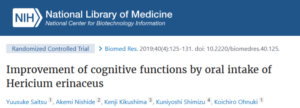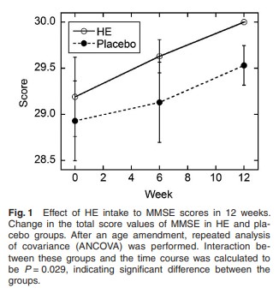Improvement of cognitive functions by oral intake of Lion’s Mane

The study “Improvement of cognitive functions by oral intake of Hericium erinaceus,” published on PubMed, delves into how the Lion’s Mane mushroom (Hericium erinaceus) can boost brain power. Here’s the lowdown in simpler terms:
- The MMSE (Mini-Mental State Examination) is a test doctors use to figure out if someone has dementia, and it’s done by asking the person some questions.
- The research showed some pretty clear results: taking Lion’s Mane supplements can actually make your brain work better if you already score okay on the MMSE.
What’s super interesting is that if you keep taking these Lion’s Mane supplements for about 12 weeks, it can make a big difference in your brain functions, especially in those MMSE scores. It’s not just about stopping your memory from getting worse; it actually makes your brain sharper.

Lion’s Mane increased Mini Mental State Examination Scores in adults with average brain function.
This suggests that Lion’s Mane might help fix and grow new connections in your brain, even for adults. The study points out that this boost in brain function is likely thanks to something called hericenones, which are mostly found in the mushroom’s fruiting body. These findings suggest that while significant benefits were observed from the part of the mushroom used in the study, exploring other parts, such as the mycelium, might reveal additional advantages.
Reference: Improvement of cognitive functions by oral intake of Hericium erinaceus – PubMed (nih.gov)
The study detailed on the web page discusses the effects of Erinacine A-enriched Hericium erinaceus mycelia (Lion’s Mane) on patients with mild Alzheimer’s Disease (AD). Here are the key findings and their potential implications for the everyday person:
- Cognitive Improvement: The Lion’s Mane group showed significant improvement in cognitive tests like the Mini-Mental State Examination (MMSE) after 49 weeks. This suggests that regular intake of Lion’s Mane could potentially help in maintaining or improving cognitive functions in individuals with mild AD.
- Daily Functioning: Participants taking Lion’s Mane also demonstrated better scores in the Instrumental Activities of Daily Living (IADL), indicating enhanced ability to perform daily tasks which can contribute to a better quality of life for those with mild AD.
- Visual Acuity: The study found that Lion’s Mane intake resulted in better contrast sensitivity, which could mean improved vision clarity for everyday activities like reading or driving.
- Safety and Tolerance: Except for a few cases of abdominal discomfort, nausea, and skin rash, Lion’s Mane was well-tolerated, suggesting it could be a safe supplement for long-term use.
For the average person, these findings imply that Lion’s Mane could be a promising natural supplement to support cognitive health and daily functioning in the face of aging and neurodegenerative conditions like AD. However, it’s important to consult healthcare providers before starting any new supplement regimen.
- Study Overview: The article discusses a pilot double-blind placebo-controlled study published in Front Aging Neurosci in 2020, examining the effects of Lion’s Mane Mushroom on patients with mild Alzheimer’s Disease (AD).
- Key Findings: After 49 weeks, the Lion’s Mane group showed significant cognitive improvements and better contrast sensitivity compared to the placebo group1. The study suggests Lion’s Mane is safe and may offer neurocognitive benefits.
- Research Significance: This research contributes to the understanding of non-pharmacological interventions in early AD stages, highlighting the potential of dietary approaches in preventing cognitive decline.
This section emphasizes the potential therapeutic effects of specific mushroom mycelia on cognitive functions, offering a promising direction for AD treatment.
- Neuroprotective Compounds: The study discusses hericenones from the fruiting body of Hericium erinaceus and their failure to promote NGF gene expression in human cells, suggesting the presence of other active compounds that could potentially improve cognitive impairment1.
- Erinacines and NGF: Erinacines from the mushroom’s mycelium can cross the brain-blood barrier, promoting NGF synthesis which is crucial for neuron survival and cognitive function, especially in Alzheimer’s Disease (AD)2.
- Lion’s Mane Potential: Lion’s Mane shows promise in improving contrast sensitivity (CS) but not visual acuity (VA) in subjects with mild AD, indicating a selective response to neural repair.
- Biomarkers and Neurodegeneration: Lion’s Mane consumption was associated with improved blood biomarkers and a reduction in neurodegeneration, as observed through advanced MRI techniques, suggesting its potential in slowing AD progression.
References: ncbi.nlm.nih.gov
